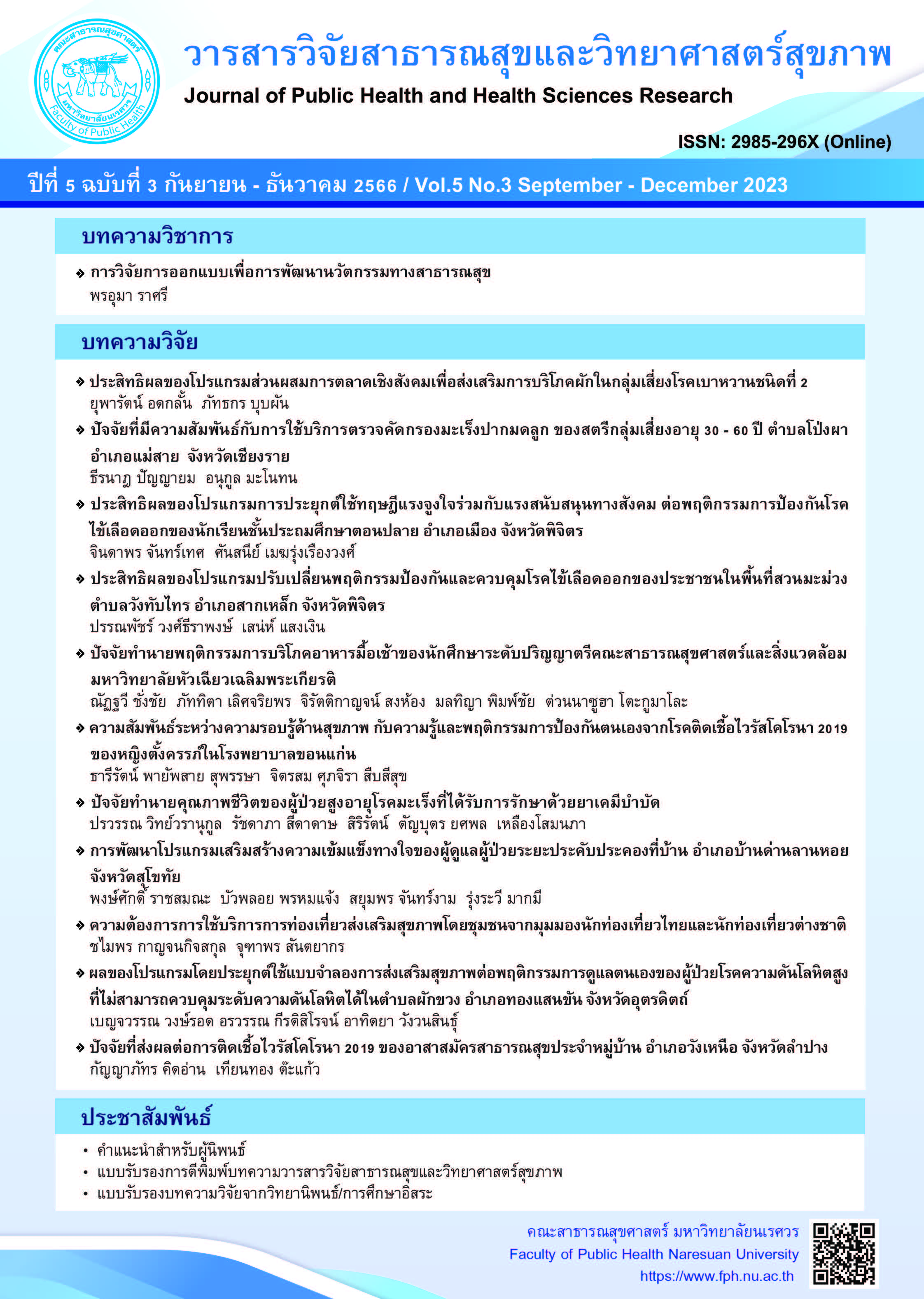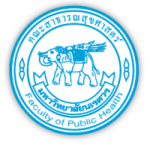A development of resilience enhancing program among the caregivers responsible for home-based palliative care patients, Bandanlanhoi District, Sukhothai Province
Keywords:
Home-based palliative care, Resilience, Resilience-enhancing program, CaregiversAbstract
Enhancing the resilience of caregivers responsible for home-based palliative care patients can improve their ability to manage caregiving burdens. This research aimed to develop a resilience-enhancing program for caregivers of patients receiving in-home palliative care. The research was conducted in 3 phases including 1) situation analysis, 2) development of a program, and 3) evaluation of the effectiveness of the program that was developed. In phases 1 and 2, a total of 48 participants were involved, including doctors, nurses, allied health professionals, health volunteers, and caregivers. For the third phase, the participants consisted of 32 caregivers. The study employed three instruments consisted of 1) a semi-structured interview questionnaire, 2) a program designed to enhance the resilience of caregivers who provide care to patients receiving palliative care at home, and 3) a questionnaire comprising questions related to demographic information and resilience. Qualitative data were analyzed by content analysis. Quantitative data were investigated using descriptive statistics and paired t-tests.
The findings revealed that caregivers faced a scarcity of mental health support and lacked adequate access to mental health services. This information was used as input for a resilience-enhancing program for caregivers. This program comprised five core activities: 1) establishing relationships and providing education on resilience, 2) cultivating self-confidence, 3) improving life management skills, 4) nurturing supportive relationships, and 5) discovering the life goal. Then, the program was implemented and evaluated. The evaluation indicated a significant increase in caregivers' resilience scores across all dimensions and overall, after the program's implementation (p-value < 0.001). These results imply that a resilience-enhancing program for caregivers of patients receiving in-home palliative care effectively supported the resilience of caregivers.
References
Aggar, C. (2012). Issues caring burden. Australian Nursing Journal, 20(5), 35.
American Psychological Association. (2015).APA dictionary of psychology. (2nd ed.). New York: Maple Press.
Bandanlanhoi Hospital. (2022). Minutes of the committee on health service system development in palliative care. Sukhothai: Bandanlanhoi hospital. (in Thai)
Bandanlanhoi Hospital. (2022). Mental health screening report of psychiatry and drug recipients. Sukhothai: Bandanlanhoi hospital. (in Thai)
Bijnsdorp, F. M., Onwuteaka-Philipsen, B. D., Boot, C. R. L., van der Beek, A. J., & Pasman, H. R. W. (2022). Caregiver’s burden at the end of life of their loved one: insights from a longitudinal qualitative study among working family caregivers. BMC palliative care, 21(1), 142.
CDC. (2021, November 22). Supporting caregivers. Retrieved March 20, 2023, from https://www.cdc.gov/aging/publications/features/supporting-caregivers.htm
Chotchai, T., Meraket, P. (2012). Factors associated with personnel’s resilience quotient level in Sirindhorn College of Public Health Khon Kaen. Proceedings of the 3rd Khon Kaen University National and International Conference 2013 on “Local Community: The Foundation of Development in the ASEAN Economic Community (AEC)”; 16-19 Feb 2013. Khon Kaen: Khon Kaen University.
Fumaneeshoat, O. (2021). Caregiver and palliative care. PSU Medical Journal, 1(3), 123-29.
Grotberg, H.E. (1995). A guide to promotion resilience in children: Strengthening the human spirit. The Hague, Netherlands: Bernard van Leer Foundation.
Gray, R., Thapsuwan, S., Thongcharoenchupong, N., & Pumsaithong P. (2013). Caregiving to older persons: Happiness and stress. Bangkok: Amarin Printing & Publishing. (in Thai)
Han, S., Chi, N.C., Han, C., Oliver, D.P., Washington, K., & Demiris, G. (2019). Adapting the resilience framework for family caregivers of hospice patients with dementia. American Journal of Alzheimer’s Disease and Other Dementias, 34(6), 399-411.
Harabutra, T. (2020). Selected factors related to resilience quotient of schizophrenic patients’ caregivers in community. Thesis of Master of Nursing, Chulalongkorn University, Bangkok. (in Thai)
Huannet, P., Dangdomyouth, P., & Upasen, R. (2018). The effect of resilience enhancement program on self-esteem of depressive patients. Journal of psychiatric nursing and mental health, 32(2), 39-51. (in Thai)
Hudson, P., Remedios, C., Zordan, R., Thomas, K., Clifton, D., Crewdson, M., et al. (2012). Guidelines for the psychosocial and bereavement support of family caregivers of palliative care patients. Journal of Palliative Medicine, 15(6), 696-702.
Jinga, T., & Khemwichai, S. (2019). The effect of the resilience enhancement program on self-esteem and suicidal ideation in suicidal attempter. Journal of Somdet Chaopraya Institute of Psychiatry, 14(1), 2-9. (in Thai)
Jiratchayaporn, K., & Chetchaovalit, T. (2015). Effect of resilience enhancing program in early adolescents in a school in Songkhla province. Journal of psychiatric nursing, 29(3), 113-124. (in Thai)
Kaspad, M., Monkong, S., & Sirapo-ngam,Y. (2013). Effects of an empowerment-based program on psychological well-being and quality of life among family caregivers of patients with advanced breast cancer. Nursing Journal of Rama, 19(2), 277-290. (in Thai)
Leelapattana, W., Hathirat, S. (2023). Working with caregiver burnout. Retrieved March 20, 2023, from https://www.rama.mahidol.ac.th/fammed/th/postgrad/article_4. (in Thai)
Nation Health Commission Office. (2020). Notification of the national health commission on the operational definitions of terms pertaining to palliative care for Thailand. Nonthaburi: NHCO Thailand.
Opsomer, S., Lauwerier, E., De Lepeleire, J., & Pype, P. (2022) Resilience in advanced cancer caregiving. A systematic review and meta-synthesis. Journal of Palliative Medicine, 36(1), 44-58.
Palacio, G. C, Krikorian, A., Gomez-Romero, M.J., & Limonero, J. T. (2020). Resilience in caregivers: A systematic review. American journal of Hospital and Palliative Medicine, 37(8), 648-658.
Phongto, K. (2012). The effect of resilience enhancement programe on suicidal ideation in suicidal attempter. Thesis of Master of Nursing Science Program, Chulalongkorn University, Bangkok. (in Thai)
Phuttharod, P., & Sillapagumpised, K. (2020). The effect of a resilience enhancement program on self-esteem and depression of the elderly with a depressive disorder. Journal of NRRU Community Research, 15(1), 70-82. (in Thai)
Pokpalagon, P. (2016). Palliative care model in Thailand. Nursing Journal of the Ministry of Public Health, 26(3),40-51. (in Thai)
Polit, D. F., & Beck, C. T. (2004). Nursing research principles and methods. (7th ed.). Philadelphia: Lippincott Williams & Wilkins.
Reigada, C., Pais-Ribeiro, J. L., Novella, A., & Goncalves, E. (2015). The caregiver role in palliative care: A systematic review of the literature. Healthcare care: Current Reviews, 3(2),1000143.
Sangsanguan, W. (2019). The effectiveness of resilience enhancement program by using problem-based learning in undergraduate nursing students. Journal of The Royal Thai Army Nurses, 20(2), 186-194. (in Thai)
Shin, S. H, Choi, H., Kim, M. J., Kim, Y. H. (2010). Comparing adolescents’ adjustment and family resilience in divorced families depending on the types of primary caregiver. Journal of clinical nursing, 19 (11-12), 1695-1706.
Sukhothai Provincial Health office. (2022). Civil service inspection report according to indicators. Sukhothai: Bandanlanhoi hospital. (in Thai)
Supaporn, K. (2020). Caregiver burden and mental health problems among the caregivers of the elderly at home-based palliative stage. Kuakarun Journal of Nursing, 27(1), 150-161. (in Thai)
Suwanmanee, M., Sae-sia, W., & Songwattana, P. (2020). Relationship between resilience and perceived care burden among caregivers of persons injured from Assault in the Unrest Situation in the Southern Border provinces of Thailand. Journal of Princess of Naradhiwas University, 6(3), 24-35. (in Thai)
Tabtim, D. (2020). Resilience enhancement program on caregiver behavior for caring for elderly diabetes mellitus patients: Mixed methods research. Thesis of Doctor of Science, Srinakharinwirot University, Bangkok. (in Thai)
Tantipiwatanaskul, P., & Sritalapinun, E. (2008). Guidelines for organizing mental strengthening activities for personnel. 2nd ed. Bangkok: The agricultural Co-operative Federation of Thailand. (in Thai)
Threeyakul, P., (2020). Effect of resilience on depression and quality of lifein persons with chronic renal failure who receiving hemodialysis. Journal of the Phrae Hospital, 28(2), 76-89. (in Thai)
World Health Organization. (2020). Palliative care. Retrieved March 20, 2023, from https://www.who.int/news-room/fact-sheets/detail/palliative-care
Downloads
Published
How to Cite
Issue
Section
License
Copyright (c) 2023 Journal of Public Health and Health Sciences Research

This work is licensed under a Creative Commons Attribution-NonCommercial-NoDerivatives 4.0 International License.
The published article is copyrighted by the Journal of Public Health and Health Sciences Research.
The statements that appear in each article in this academic and research journal are the personal opinions of each author and are not related to Naresuan University and other faculty members in the university. Responsibilities regarding each article are the responsibility of each author.






